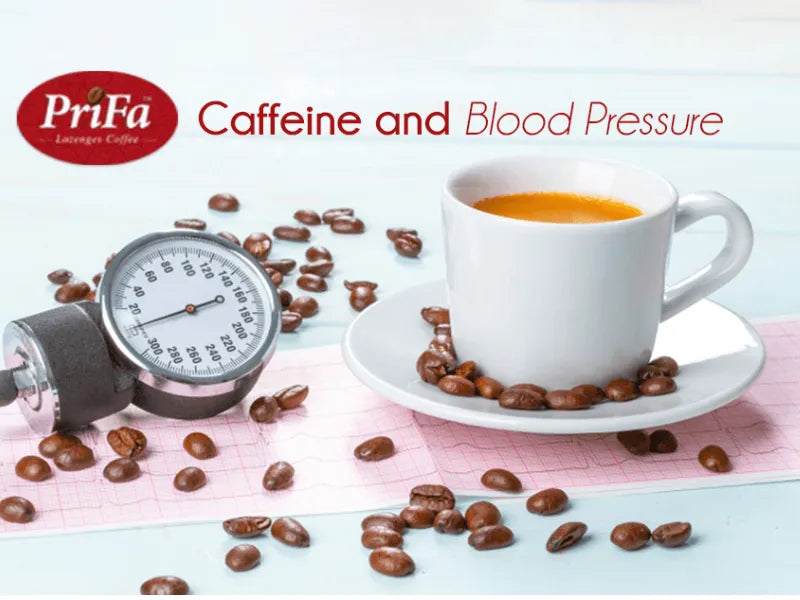
What Is the Link Between Caffeine and Blood Pressure?
Share
Discussing the link between caffeine and blood pressure is an important topic for coffee enthusiasts in general, and especially for those with blood pressure concerns.
If you're worried about the impact of your favorite beverage on your health, follow this article from Prifaco. We will delve into the latest factual data on caffeine and blood pressure, helping you adjust your lifestyle in a healthy, accurate, and comfortable way.
What is the relationship between caffeine and blood pressure?
Scientific research has shown that there is a clear relationship between caffeine and blood pressure. Caffeine causes a temporary constriction of blood vessels, leading to an increase in blood pressure.
However, consuming large quantities of caffeine beyond the recommended daily limit can have long-term effects on blood pressure.
What is the long-term effect of caffeine on blood pressure?
The response of blood pressure to caffeine varies from person to person. Regular and high consumption of caffeine can lead to the following:
- Continuous elevation of blood pressure affects the quality of life.
- Prolonged high blood pressure can lead to heart disease, stroke, and other cardiovascular complications.
- Additionally, caffeine can reduce blood flow to the heart muscle and increase the risk of irregular heartbeats.
- Increased caffeine in the blood can also raise levels of stress and anxiety, negatively impacting the heart and blood vessels of individuals with high blood pressure.

Why does caffeine affect blood pressure?
The exact reason for the increase in blood pressure when caffeine intake rises is still unknown, but it may be:
- Caffeine's effect on hormones that regulate blood vessel size results in the temporary constriction of blood vessels, leading to a temporary increase in blood pressure.
- Additionally, evidence suggests that caffeine stimulates the adrenal glands to produce more adrenaline, which also contributes to an increase in blood pressure.
Impact of Caffeine on Blood Pressure
Caffeine, a widely consumed stimulant, has a notable impact on blood pressure.
When ingested, it temporarily constricts blood vessels, leading to a short-term increase in blood pressure.
While this effect is usually brief, frequent and high consumption can contribute to sustained elevations in blood pressure, particularly in individuals with pre-existing hypertension.
Effects of Caffeine on Blood Pressure Levels
Scientific research consistently shows that caffeine can cause a temporary rise in blood pressure.
This effect is due to caffeine's ability to constrict blood vessels, which increases the resistance against blood flow and subsequently raises blood pressure.
For most people, this increase is short-lived, but for those with pre-existing hypertension, the effects can be more pronounced and may last longer.
Understanding how caffeine influences blood pressure is crucial for individuals who consume it regularly, especially those who are sensitive to its effects or have a history of hypertension.
Caffeine and Hypertension
The relationship between caffeine and hypertension is complex and varies from person to person.
Regular consumption of caffeine, especially in large amounts, can lead to sustained increases in blood pressure.
Individuals with hypertension or those at risk of developing high blood pressure should be particularly cautious.
High caffeine intake can exacerbate existing hypertension and increase the risk of cardiovascular diseases.
Additionally, caffeine can contribute to increased heart rate and anxiety, further complicating blood pressure management.
It’s important for those with hypertension to monitor their caffeine consumption and consult with healthcare professionals to assess its impact on their condition.
Does Caffeine Lower Blood Pressure?
While caffeine is known for causing short-term increases in blood pressure, it is not typically associated with lowering blood pressure.
In fact, the temporary rise in blood pressure induced by caffeine is well-documented.
Some studies suggest that regular caffeine consumers may develop a tolerance to its blood pressure-raising effects over time, but this does not necessarily mean that caffeine lowers blood pressure.
For those managing hypertension, it’s advisable to view caffeine as a potential risk factor rather than a solution for lowering blood pressure.
Managing Blood Pressure with Caffeine
Managing blood pressure while consuming caffeine involves several strategies.
The U.S. Food and Drug Administration (FDA) suggests limiting daily caffeine intake to about 400 milligrams, which is roughly equivalent to two 8-ounce cups of brewed coffee.
To minimize the impact on blood pressure, individuals should avoid high-caffeine beverages and energy drinks, especially before bedtime.
Gradually reducing caffeine intake can help mitigate its effects on blood pressure.
Switching to decaffeinated coffee or reducing the number of caffeinated drinks consumed each day can also be beneficial.
Regular monitoring of blood pressure and consulting with a healthcare provider can provide personalized advice on managing caffeine intake effectively.
How would you deal with high blood pressure if you are a coffee lover?
Here are some tips to help you control caffeine intake to reduce high blood pressure without giving up coffee completely:
- The U.S. Food and Drug Administration (FDA) suggests that a suitable daily caffeine intake is around 400 milligrams, which is roughly equivalent to two 8-ounce cups of brewed coffee.
- Avoid consuming coffee or other high-caffeine beverages within 3 to 4 hours before bedtime to prevent sleep disturbances.
- Stay away from energy drinks and other beverages with high caffeine content.
- If you are sensitive to the effects of caffeine, gradually reduce your consumption over several days or weeks.
- Consider switching to decaffeinated coffee to reduce the negative health effects of caffeine while still enjoying the taste of coffee.

Read more: caffeine.
Who should avoid caffeine to manage high blood pressure?
In the following, we will mention specific categories of people who should consider reducing their caffeine intake or avoiding it altogether. They include:
- Pregnant or breastfeeding women: Because caffeine can be transferred to the baby, making them agitated and unable to sleep peacefully.
- Individuals with caffeine sensitivity: They are more susceptible to high blood pressure.
- Those who suffer from high blood pressure or other heart-related conditions.

Prifa coffee tablets: the perfect amount of caffeine
Coffee tablets like Prifa are considered a convenient option for those looking to manage their caffeine intake and high blood pressure. They contain a safe amount of caffeine, unlike energy drinks, which are often associated with high caffeine levels and heart issues.
So, rest assured, with Prifa tablets, you can enjoy the taste and benefits of coffee while maintaining your focus, alertness, and, most importantly, your health.

How do you get Prifa coffee tablets?
To buy Prifa tablets, you can reach out to us through:
- Fill out the contact form.
- Send us an email directly.
- Chat with us on our social media accounts.
- You can also contact us at +01 23456789
Don't worry, we have 24/7 customer service, so you can expect a quick response to any questions you may have.
Additionally, you can order Prifa products directly through our online store, whether you are within the United States or outside, especially with our various payment methods to accommodate your needs.
Seize the opportunity and order Prifa coffee tablets now!
Edited by: Prifaco©
